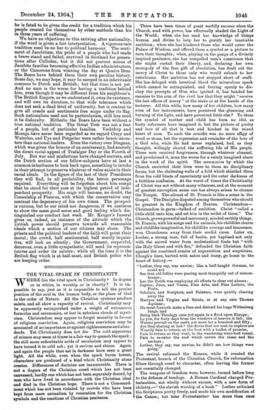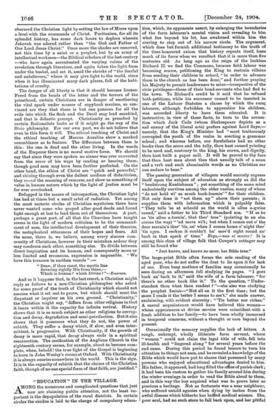W HERE lies the vital spark in Christianity ? In dogma
or in ethics, in worship or in charity ? It is im- possible to say, just as it is impossible to tell the precise position of the soul in the human body, or the place of God in the order of Nature. All the Christian systems produce saints, and all show a capacity of revival. Christianity may be apparently extinguished under a weight of extraneous formulae and ceremonies, or lost in nebulous clouds of mysti- cism. Christendom may appear to forget morality in favour of religious conviction. Again, religious conviction may be accounted of no importance as against righteousness and alms- deeds. Yet Christianity does not die. The cold aspersions of science may seem at times in a fair way to quench the spark ; the still more redoubtable acids of secularism may appear to have turned it to cold ash ; yet it revives and shines. Again and again the people that sat in darkness have seen a great light. All the while, even when the spark burns lowest, characters are produced of a kind which Christianity alone creates. Differences of doctrine are innumerable. There is not a. dogma of the Christian creed which has not been canvassed, hardly one which has not been separately denied, by men who have lived in accordance with the Christian ideal and died in the Christian hope. There is not a Command- ment which has not been violated by crowds who have been kept from mere animalism by veneration for the Christian symbols and the emotions of Christian penitence. There have been times of great worldly success when the Church, mad with power, has effectually shaded the Light of
the World ; when she has used her knowledge of things human and divine to help her to gratify her insatiable ambition ; when she has hindered those who would enter the Palace of Wisdom, and offered them a symbol or a picture to turn their thoughts ; when, playing on the pangs of a divinely inspired penitence, she has compelled men's conscience that she might curtail their liberty, and, declaring her own monopoly of the free gift of absolution, has dealt out the mercy of Christ to those only who would submit to her catechisms. Her ambition has not stopped short of craft.
She has deluged with heretical blood the miraculous spark which cannot be extinguished, and fearing openly to dis- obey the precepts of Him who ignited it, has handed her enemies to the arm of the civil law that they might " receive the last offices of mercy " at the stake or at the hands of the torturer. All this while, how many of her children, how many even of her instruments, have perceived the gleaming and burning of the light, and have perceived little else ? To them the symbol of mother and child has been no idol, as hasty reformers have imagined it, but the picture of purity and love of all that is best and kindest in the mixed heart of man. To such the crucifix was no mere effigy of wood or stone, but the expression and reminder of the love of a God who, while He had never explained, had, as they thought, willingly shared the suffering life of His people.
These men received forgiveness, through whatever channel, and proclaimed it, none the worse for a vainly imagined share in the work of the spirit. The ceremonies by which the Church encircled their lives were to them no disciplinary forms, but the sheltering walls of a fold which shielded them from the cold blasts of uncertainty and the outer darkness of a faithless confusion. At the worst of times the Christianity of Christ was not without many witnesses, and at the moment of greatest corruption some one has always arisen to cleanse the Temple. The advent of St. Francis is like a scene in the Gospel. The Disciples disputed among themselves who should
be greatest in the Kingdom of Heaven. Christendom—
Christendom in germ—talked of ambition. Christ "called a little child unto him, and set him iu the midst of them." The Church, grown powerful and mercenary, minded earthly things.
St. Francis, with his songs and his animals, his childlike charm and childlike imagination, his childlike courage and innocence, won Churchmen away from their sordid cares. Later on, Luther, a strong man, full of faults, yet baptised not only with the sacred water from ecclesiastical fonts but " with
the Holy Ghost and with fire," defended the Christian faith against the combined armies of superstition and scepticism. Clough's lines, barbed with satire and irony, go home to the heart of history:-
"
Luther, they say, was unwise ; like a half-taught German, he could not
See that old follies were passing most tranquilly out of remem- brance; Leo the Tenth was employing all efforts to clear out abuses; Jupiter, Juno, and Venus, Fine Arts, and Fine Letters, the Poets, Scholars, and Sculptors, and Painters, were quietly clearing away the Martyrs and Virgins and Saints, or at any rate Thomas Aquinas ;
lie must forsooth make a fuss and distend his huge Wittenberg lungs, and Bring back Theology once yet again in a flood upon Europe; Lo you, for forty days from the windows of heaven it fell ; the Waters prevail on the earth yet more for a hundred and fifty ; Are they abating at last ? the doves that are sent to explore are Wearily fain to return, at the best with a leaflet of promise, Fain to return as they went, to the wandering wave-tost vessel, Fain to re-enter the roof which covers the clean and the
unclean ; Luther, they say, was unwise, he didn't see how things were going."
The revival reformed the Roman, while it created the Protestant, branch of the Christian Church, for reformation filters through creed to character, often leaving the former not essentially changed.
The weapons of freedom were, however, turned before long to the defence of bondage. A Roman Cardinal charged Pro- testantism, not wholly without excuse, with a new form of idolatry,—" the slavish worship of a book." Luther criticised
the Scriptures pretty freely, and made his own modification of the Canon ; but later Protestantis:e has more than once
obscured the Christian light by setting the law of Moses upon a level with the commands of Christ. Puritanism, for all its splendid history, has some dark hours to deplore wherein Jehovah was adored rather than "the God and Father of Our Lord Jesus Christ." Once more the shades are removed, not this time by a saint or a prophet, but by an army of intellectual workmen—the Biblical scholars of the last century —who have again accentuated the varying values of the revelation through literature, and again taken the light from under the bushel, and set it, amid the shrieks of " the fearful and unbelievers," where it may give light to the world, since when it has illuminated many dark places, full of the habi- tations of cruelty.
The danger of all liberty is that it should become license. Freed from the bonds of the letter and the terrors of the priesthood, certain Christians are in danger of smothering the vital spark under masses of copybook maxims, so con- vinced are they that there is but one panacea for all the evils into which the flesh and the Devil may lead mankind, and that is didactic precept. Christianity as preached by certain Rationalists looks as if it might go the way of the Stoic philosophy. For our own part, we do not believe that even in this form it will. The ethical teaching of Christ and the ethical teaching of Marcus Aurelius show a marked resemblance as to feature. The difference between them is this : the one is dead and the other living. In the words of the Emperor there is no moral motive force. We should say that since they were spoken no sinner was ever converted from the error of his ways by reading or hearing them, though good men may have been further perfected. On the other hand, the ethics of Christ are " quick and powerful," and shining through even the dullest medium of didacticism, they reveal the meaning of remorse, and show us something of value in human nature which by the light of justice must be for ever overlooked.
Befogged in the mazes of introspection, the Christian light has had at times but a small orbit of radiation. Yet among the most esoteric circles of Christian mysticism there have never wanted some who groped after good deeds and found light enough at last to lead them out of themselves. A part, perhaps a great part, of all that the Churches have taught seems in the light of modern criticism to be the command- ment of men, the intellectual development of their theories, the metaphorical utterances of their hopes and fears. All the same, there is, we believe, among every sincere com- munity of Christians, however in their mistaken ardour they may condemn each other, something else. To divide between direct inspiration and its human, and consequently more or less limited and erroneous, expression is impossible. " We have this treasure in earthen vessels " :— " Draw, if thou canst, the mystic line
Severing rightly His from thine,— Which is human ? which Divine ?"—Emerson.
And so it happens that, in the last resort, a Christian might reply as follows to a non-Christian philosopher who asked for some proof of the truth of Christianity which should not assume what it set out to prove, but which should meet the disputant or inquirer on his own ground. " Christianity," the Christian might say, " differs from other religions in that it bears within it the capacity for infinite revival. History shows that it is as much subject as other religions to corrup- tion and decay, degradation and semi-petrifaction. But it also shows that it possesses what they do not, the power of rebirth. They suffer a decay which, if slow, and even inter- mittent, is progressive. With Christianity, if the growth of decay is more rapid, that decay always ends in a spiritual resurrection. The ossification of the Anglican Church in the eighteenth century seems, for example, about to become com- plete, when, behold ! the true light of the Gospel is beginning to burn in John Wesley's rooms at Oxford. With Christianity it is always sunrise somewhere in the world. This is the sign. It is in the capacity of rebirth that the claims of the Christian faith, though of no one special form of that faith, are justified."



































 Previous page
Previous page